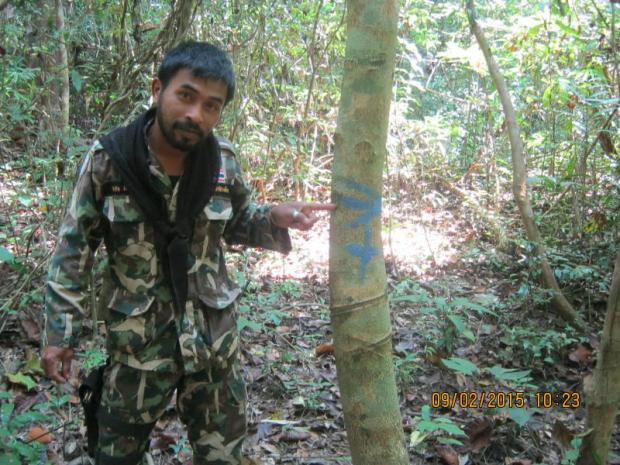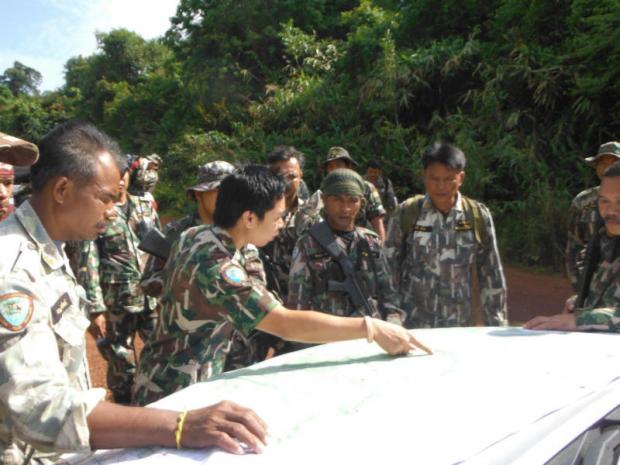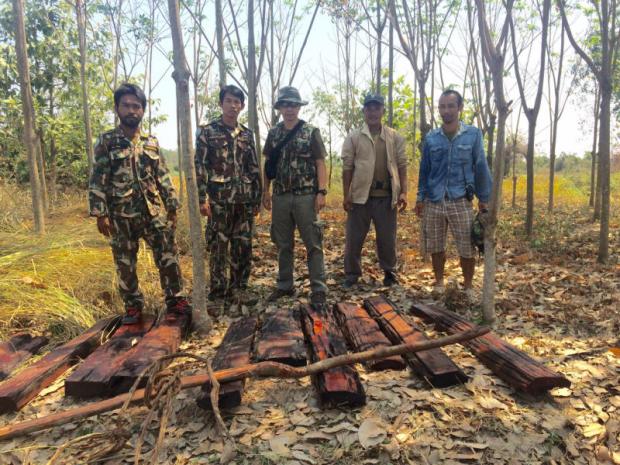
Forest ranger Warak Ngernyu and his eight colleagues were on foot patrol on the morning of July 10, 2013, when they saw the wheel tracks. Sensing that the tracks would lead to wood poachers, the team followed the trail for four hours until they reached the suspects: three Khmer-speaking men sitting on rocks.
Behind them were a dozen hand-drawn carts piled with two-metre-long pieces of processed Siamese rosewood, guarded by about 50 men. It was a common route -- poachers would usually cut rosewood in the neighbouring Tab Lan National Park and transport it through Pang Sida, the second-largest national park in Thailand's eastern region. Mr Warak crawled towards the trio and noticed that they were not carrying any weapons. He fired several warning shots and managed to arrest two of the suspects.
Poachers usually run away when warning shots are fired. But this time, they fought back.
One of the rangers was shot in the left arm with an AK-47 assault rifle, prompting Mr Warak to open fire. After two years of working as a ranger at Pang Sida in Sa Kaeo province, it would be his first clash with armed poachers.
"I was never afraid. But I saw my friend lying in a pool of blood, and it was horrible," he said.
A day later, executives from the National Parks, Wildlife and Plant Conservation Department arrived at Pang Sida in an attempt to boost the rangers' morale. Mr Warak remembered that one of the high-ranking officials had promised a promotion -- which would mean a salary rise of more than 30% and increased benefits.
Three years and two further armed clashes later, Mr Warak is still hired on a temporary basis with a monthly salary of 8,100 baht, below the maximum 9,000 baht part-time rangers could receive. "Sometimes I feel very upset and annoyed that I am still stuck in this position when some of my younger colleagues have already been granted better contracts despite never being engaged in a single clash," said the 35-year-old. "I have waited for all my life."

This way: Pang Sida part-time ranger Warak Ngernyu points at marks left by poachers which indicate to others where to go.
THE PATH TOWARDS A RANGER
All Thai forest rangers start out as part-time employees working under fixed-term yearly contracts, a method the DNP argues is due to the limited budget for hiring full-time staff who receive higher pay. Mr Warak first applied for a position about 10 years ago when he was a farmer in Sa Kaeo. After passing an endurance test and an interview, he was hired on a monthly salary of 4,300 baht.
Apart from paying 1,500 baht for each of his uniforms, he also had to purchase his own provisions. Eventually, the slow pay -- at one point he had to wait four months for his salary to arrive -- forced him to seek loans to pay the rent, and Mr Warak left the job after two years.
He joined Pang Sida again in 2013 on a salary of 7,500 baht, which was later raised to 8,100 baht a month -- he said this barely covers his living expenses.
Part-time employees make up the majority of forest rangers in Thailand, with 8,849 officers working in 150 national parks and other wildlife conservation areas. The DNP allows part-time rangers who have worked at national parks for at least five years to apply for government employee positions. The positions are open on average every two years.
Applicants are required to pass a 5km timed running test and an interview. While the position is still considered a temporary contract renewable every four years, it guarantees a higher pay ranging from 11,280-24,930 baht per month. But despite having a job title suggesting they are government officials, the 4,160 employees are not entitled to receive the health care and medical benefits for government officials and instead come under the social security scheme.
Rangers hired as permanent employees are the top ranked and receive salaries ranging from 9,400-25,670 baht. They are entitled to receive generous medical benefits for government officials as well as a government pension. There are 1,547 rangers who are permanent employees, but a government decision in 2004 scrapped the position for newcomers, as part of a plan to cut down the state's burden.
Back then, over 300 part-time rangers who had worked for five years were automatically promoted to government employees.
"Ideally, all rangers should be able to go through this same process without having to pass any examination," said Mr Warak, who is still waiting for the DNP to accept new applicants for government employees. "Several rangers are not able to pass the long-distance running exam, which to me is inappropriate. The forest terrain is different, and you only have to run for 100m or so to catch the poachers."

Deep in the danger zone: Warak Ngernyu, left, and his colleagues arrest a suspected Cambodian poacher, who was shot in the arm. The team also seized two AK-47 rifles and bullets.
LITTLE SECURITY
In 2012, the monthly salary of part time rangers was increased from a maximum of 6,000 baht to 9,000 baht. In practice, however, national parks were not able to increase the pay, and few rangers actually receive the maximum salary.
"The problem is that no national park gets an increase in its budget from the Budget Bureau, and the only way to increase salaries is to wait for someone to resign," said acting DNP deputy director-general Chalermchai Papata. "So even though the ceiling has been set at 9,000 baht, most park chiefs choose to maintain the current salary."
But despite attempts to increase the pay, part-time rangers receive little security and are covered under the 30 baht healthcare scheme, which guarantees coverage for visits to state hospitals.
"Part-time employees should be given importance to a certain extent, but government employees and permanent employees require a large boost in morale," said Mr Chalermchai.
Mr Chalermchai said the DNP is planning to propose to the Office of the Civil Service Commission an increase in the maximum salary of permanent employees by another 10,000 baht. The reasoning behind the salary push is the requirement of more sophisticated skills, such as the use of high technology equipment during patrols.
"In the past, they would only carry weapons and provisions," said Mr Chalermchai. "But now they read maps and GPS trackers to record data, as well as have the power to arrest wrongdoers."
The DNP is also in the process of amending the law to provide some form of risk allowance for rangers on duty.
A recent report commissioned by WWF and the Ranger Federation of Asia surveying 40 countries found 35% of government rangers have no life insurance, while 20% receive no health insurance and 45% lack long-term disability cover. The report also found that 38% of the countries, including half of those in Africa and Asia, employed rangers on temporary contracts without providing any insurance coverage.
Some 223 casualties have been reported since 2004, including 106 fatalities, according to the DNP. Those injured received between 10,000-20,000 baht in compensation, while families of the deceased received 30,000 baht. From 2004, the DNP paid a total of 4.59 million baht in compensation.
Mr Chalermchai said the DNP has provided all Thai rangers with occupational group life insurance since 2013.
Apart from DNP compensation for injured and dead rangers, the Foundation for Khao Yai National Park Protection provides compensation of up to 250,000 baht in the case of a death.

Pointing out issues: Pang Sida assistant chief Komson Maneekan issues instructions to rangers.
TOO MUCH EMPHASIS
Apart from the monthly patrols, Mr Warak's duties include planting trees, searching for lost people and helping tourists identify butterfly species. In one instance, he was asked to help negotiate with villagers who had allegedly encroached on national park land, as part of the government's operation to reclaim the forests.
These were the tasks, says law enforcement and criminal justice consultant Justin Gosling, which forest rangers were historically committed to. But now they are on the front line against organised criminal gangs seeking to loot the country's natural heritage.
"Organised wildlife crime evolved fast, and they [rangers] found themselves in a situation they didn't intend to be," said Mr Gosling. "They were never designed to be soldiers at all."
A 2013 United Nations Office on Drugs and Crime report estimated wildlife trafficking in Southeast Asia and the Pacific accounts for close to $2.5 billion a year, largely due to the ivory and pangolin trade.
Mr Gosling said a better approach would be to direct those resources from rangers to tackling the core criminals controlling the networks and making most of the profits. Poachers are just "pawns in the game" who are arguably at the lowest end of the criminal network.
"I don't think we should be tackling poachers as much as we are. You can arrest and kill as many as you want but they just keep coming," said Mr Gosling, who is also a former police detective from the UK who has worked in wildlife and organised crime for 24 years. "Rangers are being put into a very difficult situation, that may not even be particularly effective in addressing regional wildlife crime."
Instead of arming rangers and training them for warfare techniques, environmental crime should be treated as conventional crime as opposed to war, he said. This means the focus will instead be on training prosecutors and recruiting experienced investigators who can tackle the bigger criminals by using methods such as managing crime scenes, interviewing people, searching houses and recovering fingerprints from seized commodities.
"Wildlife seizures are achieving virtually nothing unless we start prosecuting people. Instead, we make ourselves feel good by running training courses for rangers and sending them out to tackle small-fry offenders," said Mr Gosling. "It's like a knee-jerk reaction to a very rapidly evolved situation. We end up tackling the problem in front of our nose, rather than looking at the wider network."

Tight budget: DNP's Chalermchai Papata. (Photo by Nanchanok Wongsamuth)
A DANGEROUS JOB
Last year, Mr Warak was one of the 25 rangers who participated in a 15-day advanced training course conducted by the DNP and an NGO. The rangers, who were to be part of a new anti-poaching unit, were trained in better tactics, strategies and ways to apprehend poachers.
"I was told that participating would give me a 90% chance of getting promoted [to a government employee]," he said.
Thai rangers patrol the forests with HK33 assault rifles, which Pang Sida assistant chief Komson Maneekan said are used only for self-protection. Although most poachers are unarmed, there has been an increase in armed poachers over the past few years, he said.
Mr Komson estimates that around 20% of Pang Sida rangers have left in the past three years since he started working there because of the dangerous nature of the job and the low pay.
"Many leave after two to three months, with some becoming security guards because they can't afford to feed their children," he said. "But you also have people who left higher paying jobs to become rangers. Despite the low pay, they stay because they love the job."
Around 14,556 rangers guard some 73 million rai of national park, or roughly 5,000 rai per ranger.
With the government's aim of increasing the percentage of the country's forest areas from 32% to 40% within 20 years, such a task would be difficult without an increase in the number of forest rangers, said Chaiwat Limlikhitaksorn, a former chief of Kaeng Krachan National Park.
The DNP turned down Mr Chaiwat's request to increase the amount of rangers at the park to 300, up from 83 at the time.
"The DNP does not approve increases in the number rangers, but they have high expectations for us [national parks]," said Mr Chaiwat, who now leads the "King of Tigers", a national rapid response ranger team. "They didn't understand our work. The threat in forest areas is enormous, and there is a need for the increase in both the number of rangers as well as training."
But Mr Gosling questioned the tactics being used against poachers, as well as the mandate for rangers to be armed.
"They [poachers] are armed because they're going to kill wildlife. But there is also an escalating situation where rangers have become more armed and in turn poachers feel they have to be more armed to protect themselves," he said.
While Mr Gosling noted the importance of rangers in protection against the immediate impact of poachers, he argued that putting more resources into them does not solve the problem of wildlife crime.
"I'd like to see rangers better resourced and better protected, but I don't think it solves this problem," he said. "I don't want to see 10 times the number of rangers in jungles. I'd rather see a proportionate number of rangers, investigators and anti-corruption units."
This story is the third in a series examining animal trafficking in Thailand and the region.

Pushing for change: Consultant Justin Gosling.

Heavy haul: Processed Siamese rosewood was seized before it could be smuggled across the border into Cambodia. The timber can be sold for up to 600,000 baht a tonne and is in demand in China.

Saw him coming: Pang Sida rangers arrested this suspect with equipment for logging.

Wood work: Warak Ngernyu, left, and Komson Maneekan, centre, with seized rosewood.

A rest between arrests: Pang Sida rangers take a break during a patrol, where they look for animal poachers and wood smugglers.